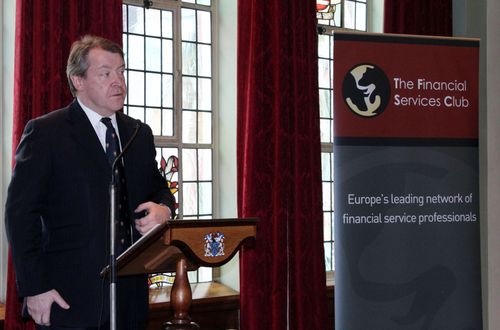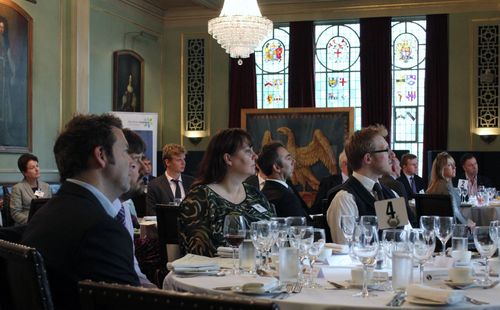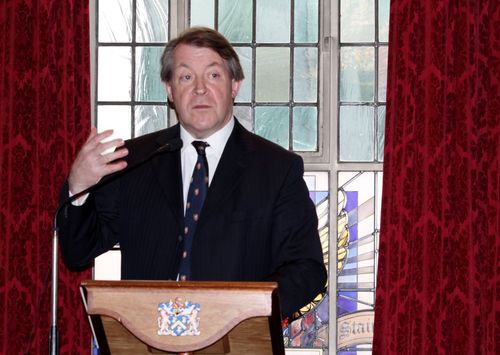
This weekend is the Lord Mayor’s Parade, where we do literally parade the new Lord Mayor of London, Fiona Woolf.
This is not the political Mayor of London, Boris, but the Lord Mayor, an office that dates back over seven centuries to the year 1189.
To celebrate the previous Lord Mayor's year in office, the Financial Services Club recently hosted Alderman Roger Gifford to reflect upon his year in office.

This was a timely and appropriate meeting, as Roger has been a career banker before assuming office, and has been head of Skandinaviska Enskilda Banken (SEB) in the United Kingdom since 2000 where he now returns after leaving office.
Here are Roger’s presentation notes from the meeting, for those who were unlucky enough to miss it:
I am delighted to be with you today. I have had a wonderful year that has seen me promote the City right across the world. And take part in ceremonial of quite byzantine complexity, and ceremony relies on a degree of mystique for its effect. It is something the City does very well, but our task is to be less mysterious about the services the City provides, and how important they are in creating growth and prosperity, from Leeds to Luanda. How the City is part of society, and contributes to so many aspects of the well-being of society as a whole.
The Office of Lord Mayor is a classic example of something the UK excels in – soft power: about persuasion, influence and debate, rather than projecting power. UK and London are well endowed with soft power assets. The assets that attract business to the UK and to London include culture, heritage, business environment, commitment to the rule of law and more. In fact, I am giving evidence to the House of Lords Select Committee on this subject very shortly.
And I have seen many elements of soft power highlighted throughout my year in office, especially London’s diversity and traditions of respect and tolerance, most recently at the interfaith meeting we had here at Mansion House which was attended by representatives of all of the major faiths. That is a classic example of the City in society, as central to London as the financial services we provide.
There is also a very international role for the City, and that soft power is demonstrated in carrying on the work of past Lord Mayors. For example, this year we have had many business missions to getting on for over thirty countries: Ireland, Oman, Saudi Arabia, UAE, Qatar, Turkey, Japan, Republic of Korea, Lithuania, Estonia, Angola, Nigeria, Ghana, Russia, Finland, Sweden, Norway, Chile, Peru, Colombia, Panama, Mexico, China, Hong Kong, Mongolia, Malaysia, Indonesia, Burma, Kuwait and Jordan, with the latter an invitation following a lunch at Mansion House co-hosted by the King of Jordan.

We had an excellent and engaging business delegation in Africa, and want to see more City businesses represented on these visits. I was delighted that last week’s visit to the Middle East was alongside the Government’s Trade Envoy, Baroness Morris, and the largest business delegation the UK had taken to Jordan. Similarly, in Latin America, I saw the potential for business for UK PLC, especially in infrastructure. The success of London 2012 really has supercharged our reputation in delivering huge sporting events but, more than that, for quality and reliability.
As has been reported in the press, I am out and proud as a ‘joyfully boring banker’. I think the reason this phrase is seized upon by journalists is because it affords a very different view to the recent media portrayals of my industry. I am glad to advocate the extremely positive story about banking and the whole range of financial services provided by the City of London, and their role in creating and sustaining growth for the globally economy. That is exactly what is meant by the City and society.
And the banking industry includes around 140,000 of my own colleagues in the foreign banking sector here in London. That international character of the City is essential to our international reach, with half of all large UK financial services companies foreign-owned. This is true of US firms in particular, but increasingly by the newer market economies of the BRICs – Brazil, Russia, India and China – who have increased their investments in UK financial services by a third.
As financial services become more globalised, that will play to London’s strengths, and we will see more investment come to the UK as a result. We want to work with these financial centres, rather than pretending we are going to take business from them.
That is why the City has partnered with emerging financial centres to develop their markets and expertise from Moscow to Nairobi to Casablanca. Their development and success will pump prime the wider economy through global trade volumes, and that will be good for the City and the UK itself.
The same is true of China, where a City delegation visited in September. We launched the City of London imitative last year, which aims to make London the European centre for Renminbi (RMB) business. We are having a great deal of success in this area, and last year became the second largest centre for offshore RMB payments, only behind Hong Kong. Our intention is to be a key partner in this area for years to come, as the Chancellor and Boris Johnston made clear on their recent visit.

I was asked personally on a visit to Angola: how can a local SME hope to engage with the giant of the City of London? The answer is to see the City in terms of scale. It is a giant. A global financial centre. But this giant is made up of thousands of services providers. There has never been a better time to look to the banks to perform their core function of lending to support growth.
The City Brand is still strong, with huge respect out there for UK companies. The challenge is to get UK companies out there. I have met some bemusement that British companies are not out there taking the wealth of opportunities available but have been really impressed by UKTI. The City intends to back them to the hilt, and I am looking forward to working with Ian Livingston as we have so productively done with Stephen Green.
The City has always focused upon other markets, and particularly those in Europe. We recognise the need for a community of nations because London is a community of nations with 300 nationalities and 270 languages.
Why we are so focused upon the current European debate is that the City has to step up to our engagement with EU institutions and member states. The City needs to lead a dialogue about its role as Europe’s international financial and business centre, contributing evidence to the debate about the impact upon the UK of EU membership and supporting debates, whether that is through think tanks, government or business.
The mantra we need to use is being Pro Europe and Pro Reform. Our overacting policy objective must be focused upon the success and completion of the single market. As Sir Richard Lambert reasoned in a recent lecture, this is more than a free trade agreement, which gets rid of tariff and subsidy barriers to trade. An effective single market will grapple with non-tariff barriers, such as regulatory differences between different regimes. This is often a far greater block to cross border trade than tariff barriers.
The case for reform is strong, but so is the evidence of the benefits of the EU membership, which are all around us in the City, especially in terms of the foreign direct investment we attract as a result. International businesses bring investment, accounting for around half of British manufacturing and over 40% of services sector output. And they bring with them innovation and R&D Capabilities. In fact, foreign owned businesses account for a quarter of all UK R&D and that wherewithal has transformed whole sectors of the British economy, including financial services. These firms are hugely influenced as they make London a truly international marketplace.
The statistics are compelling, and we have seen a real change in perspective as a result of our interventions in this debate, in the extent and depth of the City’s engagement and with our shared work with organisations such as the CBI. This has shown how solid well-researched engagement can be with changing attitudes to key issues.
But we have to understand the emotional arguments as well. Europe arouses emotions here in the UK. Commissioner Draghi has spoken of a more European Britain, as well as a more British Europe. Perhaps the British need to understand more of the emotional underpinning of the European project, of ending conflict and striving for prosperity on a mainland that has been consumer by war for centuries past.
So the City has and will continue to play a constructive and engaged part in getting rules and regulations right, especially at an EU level and especially in the banking industry.
As Michael Heseltine pointed out, coming out of the EU might mean a life of waiting for emails to learn what new standards we must accept for our products and services if we wish to trade in a European marketplace. In that case, if we do not accept European edicts, we will be cut out of our home market. Of course, we should look to markets of Asia, but that can never be to the exclusion of the EU.
Above all, the UK has to stay competitive. That means proper reform of the EU, just as it has meant proper reform of the banking sector. Everyone, whether they work in a bank or right across the services sector, can learn lessons from the last five years, but what is important now is that lessons have been learnt and acted upon. The banking sector in the UK today is well regulated and well run, focused upon serving clients and business and generating growth across the economy, just as most banks and bankers always were.
When I’ve been abroad this year, I don’t hear a lot of misery about the banking crisis, but I do hear admiration for the way the UK is analysing the challenges, tackling issues of concern head on, and reaching for robust solutions that will last for the long term.
London is more than ever a home for international investors – from Cairo to Kuwait and Cyprus to Seoul – looking for a safe and well regulated environment.
In conclusion, I am optimistic about the City’s future. Relying on the ability of technology to predict and manage risk was one of the causes of the financial crisis. But technology, properly harnessed, can be the source of transformation and new growth.
Time and time again, history teaches us that crisis is followed by huge innovation and change, and we can use the benefits that technology brings in economies of scale and efficiency to stay competitive.
Thank you.
Chris M Skinner
Chris Skinner is best known as an independent commentator on the financial markets through his blog, TheFinanser.com, as author of the bestselling book Digital Bank, and Chair of the European networking forum the Financial Services Club. He has been voted one of the most influential people in banking by The Financial Brand (as well as one of the best blogs), a FinTech Titan (Next Bank), one of the Fintech Leaders you need to follow (City AM, Deluxe and Jax Finance), as well as one of the Top 40 most influential people in financial technology by the Wall Street Journal's Financial News. To learn more click here...

